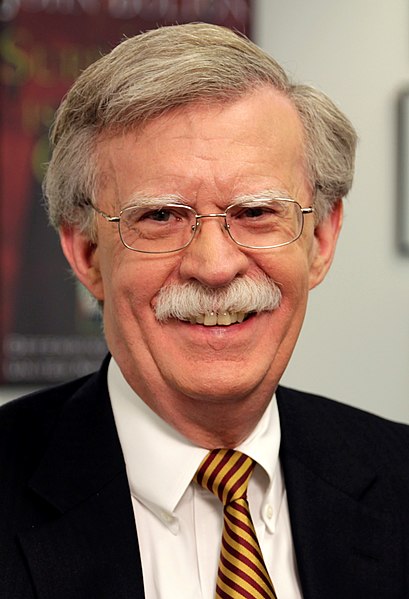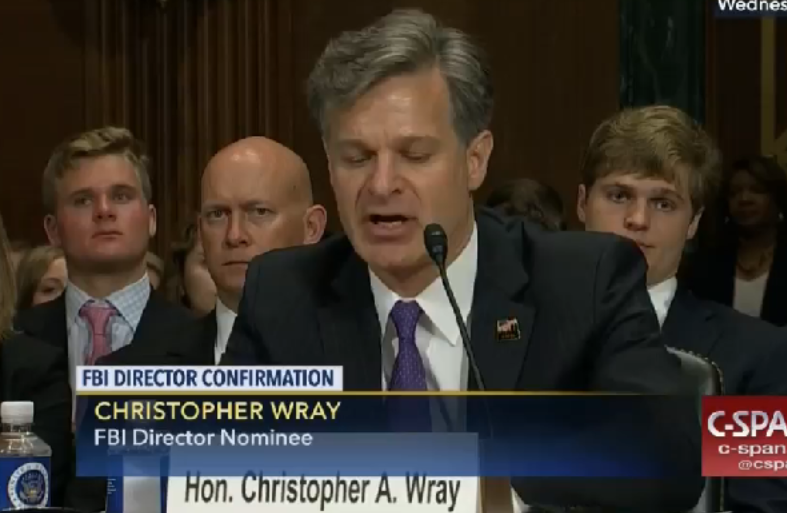The Significance of Fiona Hill’s Testimony: “Whatever Drug Deal Sondland and Mulvaney Are Cooking Up”
A number of people on Twitter have asked me to elaborate on some comments I’ve made about the significance of Fiona Hill’s testimony before the Ukraine impeachment team yesterday.
It’s unclear whether she shared details of her testimony or whether most of the reporting comes from Jamie Raskin (who notably got the import of the State IG’s urgent briefing utterly wrong). But NYT has thus far offered the key description (citing at least two other people beyond Raskin).
Force Bolton to shit or get off the pot
First, the NYT describes Hill citing the abrasive John Bolton saying two fairly stunning things which were bound to make headlines. First, she described Bolton saying Rudy was a “hand grenade” who would blow everyone up (a quote Rudy has already responded to).
Mr. Bolton expressed grave concerns to Ms. Hill about the campaign being run by Mr. Giuliani. “Giuliani’s a hand grenade who’s going to blow everybody up,” Ms. Hill quoted Mr. Bolton as saying during an earlier conversation.
Then, after a July 10 meeting where it became clear Trump was withholding security assistance for campaign propaganda, according to reports of Hill’s testimony, Bolton asked her to tell Deputy White House Counsel John Eisenberg that he was not part of “whatever drug deal” Trump’s flunkies were pursuing.
“I am not part of whatever drug deal Sondland and Mulvaney are cooking up,” Mr. Bolton, a Yale-trained lawyer, told Ms. Hill to tell White House lawyers, according to two people at the deposition.
It was clear even before the July 25 call that kicked off this whole scandal that Bolton was on the outs. Tellingly, Bolton was specifically excluded from the call.
But since then, Bolton has (like James Mattis) been talking about writing a book, telling his story for history, rather than for the present and the sake of the Constitution.
By including these two quotes in her testimony, Hill not only ensured that Bolton will be the target of Trump’s ire (after all, Hill didn’t say these things, Bolton reportedly did). But it will force Bolton to either deny them (if he’s certain Hill didn’t take contemporaneous notes), or take a stand against activities he clearly recognized were wrong.
And if Bolton testifies in the impeachment inquiry about his concerns, it will represent someone about whom there can be no doubts as to Republican partisan loyalty. If Hill’s inclusion of Bolton’s comments leads Trump’s former National Security Advisor to provide damning testimony to the impeachment inquiry, it will change both the profile of the inquiry and the possible response attacks.
Force Sondland to rewrite his ever-evolving testimony
Hill’s testimony about that July 10 meeting also provided damning testimony about Gordon Sondland, who is scheduled to testify on Thursday.
One of the most dramatic moments she described came in the July 10 meeting in Mr. Bolton’s office that included Mr. Sondland; Kurt D. Volker, then the special envoy for Ukraine; Rick Perry, the energy secretary; and two Ukrainian officials.
The purpose of the meeting was to talk about technical assistance to Ukraine’s national security council. The Ukrainians were eager to set up a meeting between Mr. Trump and Mr. Zelensky, who was elected on a promise to clean up corruption and resolve the country’s five-year war with Russian-armed separatists.
Mr. Bolton was trying to not commit to a meeting, according to Ms. Hill’s testimony. Mr. Sondland got agitated, Ms. Hill testified, and let out that there was an agreement with Mr. Mulvaney that there would be a meeting if Ukraine opened up the investigations the White House was seeking.
Mr. Bolton immediately ended the meeting abruptly. As the group moved toward the door, Mr. Sondland said he wanted them to come down to the ward room next to the White House mess to discuss next steps. Mr. Bolton pulled Ms. Hill aside to instruct her to go to the ward room and report to him what they talked about.
When she got downstairs, Mr. Sondland was talking with the Ukrainians and specifically mentioned Burisma, the Ukrainian energy firm that had Hunter Biden, the former vice president’s son, on its board.
Sondland has already test driven two drafts of his intended testimony, much as Michael Cohen did two years ago before he gave false testimony to Congress. Even the most recent of those drafts appears to be rendered inoperative by Hill’s testimony.
I’m sure Adam Schiff would have preferred that Sondland not get another chance to craft his testimony (and I suspect Sondland’s lawyer is trying to convince him that the possibility of being named Secretary of State is not worth perjuring himself for, which is why he’s probably not yet planning on invoking the Fifth).
But thus far, Sondland doesn’t seem to have discovered a story that he can tell that coheres with the other known testimony.
Hill ties Sondland’s actions to Trump
Hill also provided testimony — testimony we know that is backed by other witnesses — that Sondland was playing the role he was playing because the President wanted him to be.
At one point, she confronted Mr. Sondland, who had inserted himself into dealings with Ukraine even though it was not part of his official portfolio, according to the people informed about Ms. Hill’s testimony.
He told her that he was in charge of Ukraine, a moment she compared to Secretary of State Alexander M. Haig Jr.’s declaration that he was in charge after the Ronald Reagan assassination attempt, according to those who heard the testimony.
According to whom, she asked.
The president, he answered.
This will tie Trump directly to this scheme and make Sondland’s later denials about whether he knew Trump to be lying about a quid pro quo even more obviously false than they already are. This is not Rudy freelancing, or State ordering him to, but Trump ordering everyone to.
Hill implicates John Eisenberg
I noted the central role of John Eisenberg in attempts to cover this quid pro quo up weeks ago (and noted that he succeeded in preventing any record of an early quid pro quo from being being made).
Eisenberg is the guy who decided to put the transcript of the July 25 call on the Top Secret server. Eisenberg had a role in framing the crimes, as described to DOJ, such that they could shunt them to Public Integrity and dismiss them, rather than open up another Special Counsel investigation into the President’s extortion.
But Hill’s testimony makes it clear Eisenberg was told of what Bolton analogized to crimes well before the call.
Ms. Hill went back upstairs and reported the encounter to Mr. Bolton, who promptly instructed her to report the issue to John A. Eisenberg, a deputy White House counsel and the chief legal adviser for the National Security Council, along with his line about the drug deal, which he meant metaphorically.
Mr. Eisenberg told Ms. Hill he would report it up his chain of command, which would typically mean Pat Cipollone, the White House counsel.
Eisenberg (whose FBI 302 from the last Trump criminal investigation DOJ is trying to withhold) would have been on the hook anyway for a clear attempt to cover up Trump’s crime. But the revelation that he had advance warning that a crime was in process — and apparently did nothing to prevent it — changes his exposure significantly.
It was the OMB Director, misappropriating funds, in the National Security Advisor’s office
Finally, Hill puts Mick Mulvaney at the scene of the crime.
As I’ve said before, one part of this scandal that has gotten far too little attention is that, to extort Ukraine, Trump withheld funds appropriated by Congress, funds about which there was bipartisan agreement.
Last week, CNN and WSJ reported that to do this, OMB changed the way the funds were distributed, putting a political flunkie in charge, also a detail that has gotten far too little attention.
Not only does that raise the Constitutional stakes of the Executive’s refusal to spend the funds Congress had duly appropriated, but it shows consciousness of guilt.
And per Hill’s testimony Mick Mulvaney, serving in the dual role of OMB chief and Chief of Staff, knew that those funds were being withheld for a quid pro quo or (as John Bolton described it) a drug deal.
Senate Republicans might not ever convict Trump for demanding foreign countries invent propaganda on his political allies. They might feel differently once it becomes clear that the crime involves refusing to do what Congress, with its power of the purse, told him to, without even telling Congress he was doing so (or why). They may not care about Trump pressing for any political advantage for their party, but they may care about Trump neutering their most important authority.



